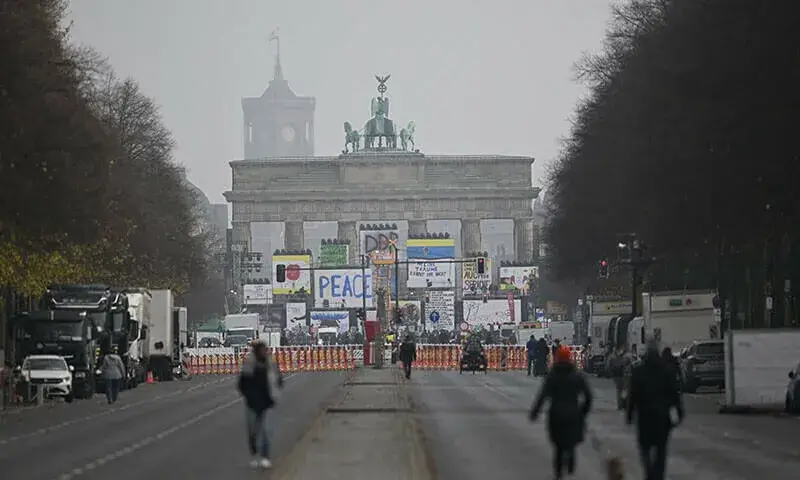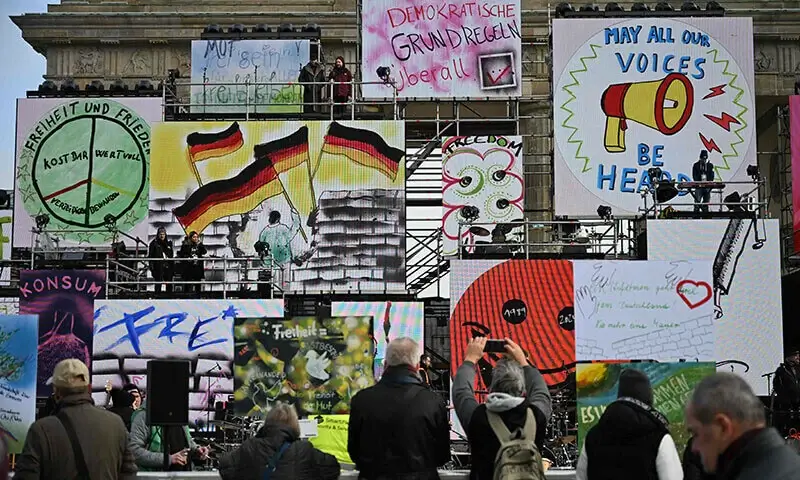Berlin Wall Legacy: Historic Celebration Under Shadow of Current Challenges
Germany marked the 35th anniversary of the Berlin Wall’s fall with festivities themed “Preserve Freedom!” The celebration comes at a time when democratic values face challenges worldwide, including conflicts in Gaza and Ukraine, and domestic political turmoil in Germany itself.
Berlin Wall Memorial Events:
- A solemn service at the Berlin Wall Memorial, attended by President Frank-Walter Steinmeier
- “Freedom party” featuring music and light show at Brandenburg Gate
- Performance by Russian protest band Pussy Riot planned at former Stasi headquarters
- Art installations displaying thousands of citizen-created images themed around “freedom”
- Four-kilometer display of replica placards from the 1989 protests

Berlin Wall’s Legacy: Remembering Lives Lost and Liberty Gained
The commemoration honored at least 140 people who lost their lives attempting to flee the Russian-backed German Democratic Republic (GDR) during the Cold War. Berlin Mayor Kai Wegner emphasized that
“freedom and democracy have never been a given,”
a message that resonates strongly in today’s political climate.
Berlin Wall Anniversary Draws Global Democracy Activists
The event brought together pro-democracy voices from around the world, including:
- Belarusian opposition leader Svetlana Tikhanovskaya
- Iranian dissident Masih Alinejad
- Various activists and speakers addressing current democratic challenges
Post-Berlin Wall Era: Contemporary Challenges to Unity
The celebration occurs against a backdrop of domestic political challenges:
- Recent collapse of Chancellor Olaf Scholz’s governing coalition
- Rising support for the far-right Alternative for Germany in eastern regions
- Persistent economic disparities between eastern and western Germany
- Growing concerns about populism and social division
Berlin Wall’s Fall: Historical Significance and Modern Relevance
The fall of the 155-kilometer “wall of shame” in 1989 marked a pivotal moment in world history, leading to German reunification and the collapse of Soviet Communism in Eastern Europe. Culture Minister Claudia Roth described it as “one of the most joyous moments in world history,” while Berlin’s cultural official Joe Chialo emphasized its contemporary relevance “at a time when we are confronted by rising populism, disinformation and social division.”
Beyond the Berlin Wall: A Day of Dual Historical Significance
The date also marks a darker chapter in German history – the anniversary of Kristallnacht, the 1938 Nazi pogrom against Jews. Government spokesperson Christiane Hoffmann stressed the importance of remembering these events and applying their lessons to contemporary challenges, particularly in light of recent arrests of AfD members suspected of involvement in a racist paramilitary group.
The anniversary celebrations serve as both a commemoration of past achievements and a reminder of the ongoing need to protect democratic values in an increasingly complex global landscape. As Chancellor Scholz noted, the liberal ideals of 1989 “are not something we can take for granted,” a message that resonates strongly amid current domestic and international challenges.

